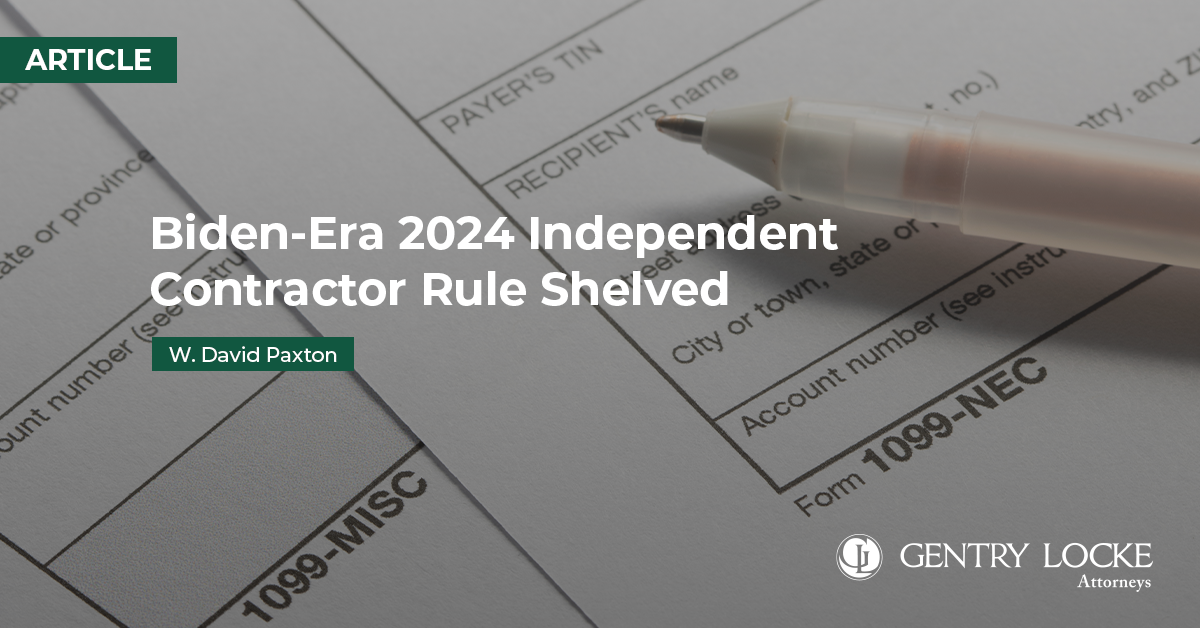Biden-Era 2024 Independent Contractor Rule Shelved

On May 1, 2025, the U.S. Department of Labor issued a field assistance bulletin, Wage and Hour Memorandum No. 2025-1, stating that it would no longer apply the 2024 Rule used to determine when workers are independent contractors or employees under the Fair Labor Standards Act. Instead, the DOL said it will enforce the FLSA in accordance with Fact Sheet #13 (July 2008) as informed by Opinion Letter FLSA2025-2, which involves service providers working in a virtual marketplace company.
The Trump DOL did not rescind the regulations that created the 2024 Biden-Era Rule, it simply stated it plans to not to use it. The 2024 Rule had laid out a comprehensive 6-prong economic reality test to determine whether a worker was an employee or an independent contractor. The 2024 Rule contrasted with the 2021 Rule issued during the last days of Trump 1.0 which emphasized two factors: the worker’s ability to control their work and the opportunity for profit as a result of personal investment. Notably, current Trump DOL did not simply revert to the 2021 Rule. Instead, the WHD says that it will enforce the FLSA in accordance with the 2008 Fact Sheet.
The 2008 Fact Sheets requires DOL to consider 7 distinct criteria:
- The extent to which the services provided are integral to the company’s business;
- The permanency of the working relationship;
- The amount of the worker’s investment in facilities and equipment;
- The nature and degree of control of a company;
- The worker’s opportunities for profit and loss;
- The amount of initiative, judgment or foresight in open market competition with others is required for the worker’s success; and
- The degree of independent organization and operation.
The Fact Sheet also notes that some factors are “immaterial” to the determination. For example, the place where the work is performed, the lack of a formal agreement, whether the worker is licensed by the state or local government, and the time or mode of payment for services are said to have no bearing on determinations of whether there is an employment relationship.
Overall, most commentators see the DOL’s position as creating room for future rulemaking and as demonstrating a commitment to protecting flexible and worker freedom.
The announcement that the 2024 Rule was being shelved was not unexpected, but the move to use the 2008 Guidance is somewhat of a surprise. Given that DOL enforcement staff is being reduced as part of the overall Trump initiative to downsize the federal bureaucracy, it seems likely that DOL will have fewer resources to aggressively pursue claims on behalf of workers. However, given Secretary Chavez-DeRemer’s strong labor background it is possible this misclassification issue might be a priority area for enforcement. Once Andrew Rogers is confirmed as the new WHD Administrator we will have a much better sense of how this misclassification issue play out during Trump 2.0.
Since 2020, we have seen a rise in the number of misclassification cases filed by individuals following the passage of the new misclassification rules adopted in Virginia, (Va. Code 58.1-1900, et. seq.) and the new Virginia statute authorizing claims of wage theft by employees (and groups of employees). When employees prevail on these claims the “employer” can be liable for the unpaid wages, 8% pre-judgment interest on those wages, liquidated damages equal to unpaid wages, plus attorney fees (Va. Code 401.-29). Virginia law also provides for civil fines and criminal exposure for willful violations committed with the intent to defraud.
We do not expect this new Trump enforcement guidance to have an impact on the number of misclassifications filed against Virginia companies. If your company or organization has questions about its use of independent contractors or the possible misclassification of certain workers, please contact any member of Gentry Locke’s Employment team for advice on the latest developments and guidance on how to address potential issues in this area.
Photo from Tada Images/Shutterstock





